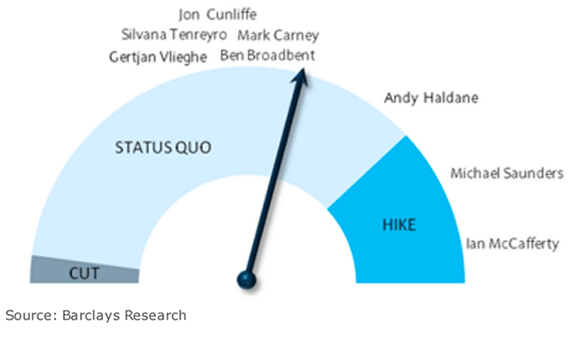A November Interest Rate Rise at Bank of England just Became more Likely

Bank of England Chief Economist Andy Haldane sent ripples across financial markets on Wednesday, June 22 having stated that a “partial withdrawal of the additional policy insurance the MPC put in place last year would be prudent relatively soon”.
That it came from one of the more cautious members of the Bank’s decision-making body is significant as it suggests other members of the Monetary Policy Committee might also be close to voting for an interest rate rise.
Furthermore, as Chief Economist, Haldane carries significant influence on the Committee.
Haldane argues that the risks of raising interest rates too late are now greater than the risks associated with moving too soon.
Haldane’s notes the UK economy continues to show resilience and this would justify the withdrawal of the stimulus delivered by the 0.25% cut that came in the wake of the Brexit vote.
His views are similar to the three members of the MPC who voted for a rate rise in June - Kristin Forbes was joined by Michael Saunders, and Ian McCafferty in voting for a 25bp hike.
“While we maintain our view that the Bank Rate will be unchanged over our forecast horizon (2017-18) given our lower growth profile relative to the BoE, we believe that the risks of a +25bp rate hike in November 2017 have increased mainly because we see Haldane as one of the more influential MPC members,” says Fabrice Montagne at Barclays.
Barclays caution that they still expect the future path of interest rates to depend heavily on incoming data.
Montagne says he and his team have over-emphasised the slowdown and the benign outlook for inflation, while the Bank has over-emphasised the resilience of the economy and the upside risks to inflation.
It must be noted that as Bank of England Chief Economist, Haldane’s views are likely to reflect the regular economic analysis and research of Bank staff, and hence are marginally more up to date than as at the May 2017 Inflation Report.
Furthermore, “given his standing at the Bank and within the Committee, it would be unsurprising if his voting for a hike were to influence other members presently voting for the status quo,” says Montagne.
Barclays, like the rest of the market, have long viewed Haldane as one of the most dovish MPC members and he is also one of the less likely to make claims without the intention to act.
With two members voting for a hike already (three, counting Forbes who is leaving the MPC by the end of month), and adding Andy Haldane “relatively soon” to the mix, “the status quo is now credibly challenged within the MPC,” says Montagne.

Andy Haldane believes that if the data were to confirm the Bank’s forecasts, the MPC should decide to withdraw the extra stimulus announced last year but without committing to a rate cycle.
This idea was also put forward by the dissenters in the June MPC minutes.
“That would however imply that the assessment of the state of the economy as well as the impact of a given level of policy accommodation can be done with a sufficient degree of precision,” says Montagne. “We do not believe these assumptions are right in normal times, let alone against the backdrop of Brexit.”
The analyst argues central banks are the most effective when operating in a cycle, not by discretionarily adjusting the monetary policy stance.
Analysts at UBS have also been thrown off-kilter by the latest developments at the Bank.
Strategist John Wraith says he still expects weaker UK economic data to persist and ultimately lead the BoE to downgrade its own expectations and disarm the hawks, but the change in tone is for the time being set to introduce more two-way risk.
"Our forecast for more monetary easing in due course is clearly put at risk by these developments, but we stick to it for now while we assess incoming data to see if it supports our case, or that of the new and prospective MPC hawks," says Wraith.
The next installment of this story comes with the release of Q2 GDP data which is released on the 26 July.
We will then assess the August Inflation Report on 3 August as this will contain the latest official set of Bank of England staff economic forecasts.
“If the Bank was to hike by the end of the year, it would likely do so in November and prepare markets in August,” says Montagne.



